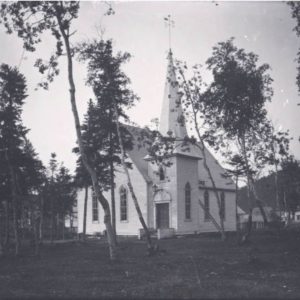Spelling variants found: McVicar, McVicars, MacVicar, McVickar
Philip McVicar was born on May 9th 1848 in Cape Breton, Nova Scotia to Scottish parents. He moved to Newfoundland in the 1870s and had close ties with the early German mining operations in Northern Newfoundland under Baron Franz von Ellershausen and Adolf Guzman. He likely started mining on the island under their leadership at the site of their first operations in Betts Cove. He was one of Little Bay’s pioneering mine captains so I place his arrival at the mine’s start in 1878. Mine Captain Philip McVicar was 30 years old at that time.
He’d travel the island in the company of Guzman confirming prospecting claims. There were high expectations about the heights these new mining operations were going to take Newfoundland going forward and the whole endeavour was attracting international attention. In local media the men found at the forefront of these expanding efforts were public figures. Their comings and goings across the island were noteworthy. Their very arrival suggested the possibility of economic boom for a community. His stature was further aided by his personality. Philip McVicar’s manner was described as courteous and affable. This had won him esteem and good-will from those acquainted with him. In this light Little Bay’s Mine Captain Philip McVicar can be understood as something of a 19th century Newfoundland celebrity.
 His wedding was certainly a big deal. It took place on October 27th in 1881. Eliza Crane was his bride. She was the youngest daughter of James Crane from Upper Island Cove, Conception Bay. The occasion was a public event and as such was reported island-wide by various Newfoundland newspapers. Eliza was attended by her bridesmaids Miss Davis and Miss Winton. Philip’s groomsmen were his brother L. McVicar and Little Bay’s first surgeon Dr. Stafford. The ceremony was performed by Rev. W. Scott Whittier and conducted at St. Andrew’s in The Bight. It was decorated and illuminated brilliantly for the event of the season. The church was filled beyond capacity and a large crowd further gathered around the outside of the building. Onlookers stood armed with guns in hand and fired salutes into the air as the celebrity couple left the church newly married.
His wedding was certainly a big deal. It took place on October 27th in 1881. Eliza Crane was his bride. She was the youngest daughter of James Crane from Upper Island Cove, Conception Bay. The occasion was a public event and as such was reported island-wide by various Newfoundland newspapers. Eliza was attended by her bridesmaids Miss Davis and Miss Winton. Philip’s groomsmen were his brother L. McVicar and Little Bay’s first surgeon Dr. Stafford. The ceremony was performed by Rev. W. Scott Whittier and conducted at St. Andrew’s in The Bight. It was decorated and illuminated brilliantly for the event of the season. The church was filled beyond capacity and a large crowd further gathered around the outside of the building. Onlookers stood armed with guns in hand and fired salutes into the air as the celebrity couple left the church newly married.
It was about this time that Baron Ellershausen found out there was silver in Placentia. 1881 was going to be a transitional year. The Germans who owned the Little Bay mine under their Betts Cove Mining Company sold it to an American firm called The Newfoundland Consolidated Mining Company just before Christmas in 1880. It would take more than a year for the mine to sort out its new management structure. The town’s demographic changed drastically as well. The German Presbyterian miners who’d composed much of the original population started returning to their homes in Nova Scotia. This altered not only Little Bay’s mining but also the composition of the town’s language and religion. The tension that followed was palpable as Little Bay collectively held its breath waiting to find out what would happen next.
I haven’t sussed out all the ins and outs of this yet but I believe the whole thing traces back to an earlier scheme by the Germans to knock a man named Dr. Stirling off the original Little Bay claim back in ‘78. He was replaced by Dr. Eales. It’s the ensuing legal battles, I believe, that finally run the Germans off the island. I can’t prove it yet but I suspect something of a chess match had been going on behind the scenes between those who’d supported the Germans and those who’d supported Dr. Stirling. The second Little Bay mine manager after Guzman ends up being an Australian named E.C. Wallace who’d likely previously been working under them back in Betts Cove. Wallace and Stirling were friends which is saying something as Wallace wasn’t liked by many. He’d turn out to be a bad fit for the manager job. This, I suspect, the Germans already knew considering he’d been overqualified and under utilized the whole time prior.
The German sale of the operation further occurred amid claims of conspiracy and collusion involving the Newfoundland government. Baron Ellershausen had longstanding ties with Premier Whiteway and every law changed by Whiteway to aid the German efforts had put money in both of their pockets. If you want to read more of my thoughts on this have a look at my articles on Ellershausen, Guzman, Wallace, and Eales but for now I just wanted to suggest some context for what next transpired in 1883 with regard to Philip McVicar.
By 1883 the Germans no longer owned Little Bay mine and Guzman had already left Newfoundland for Arizona. But Baron Ellershausen wasn’t quite done with our island yet because, as I mentioned earlier, he gotten wind of silver being worked in Placentia. That operation was being ran by a couple of Fowler brothers and they were making a bloody mess of it. Underground access to its ore had been cutoff by the workings and flooded by water. There was silver there but they’d made such a mess of things they could no longer get it out. The Baron took it over under a London based company called The Cliff Silver Mines Company Limited. The oversight of an operation like this was something Baron Ellershausen would normally have assigned to Adolph Guzman but he now lacked that option. The job ended up going to Captain McVicar. McVicar took 50 men with him there to get it handled. The lot of them were skilled miners who’d been trained under the Germans in the Betts Cove and Little Bay mines.
Now, at the same time McVicar undertook what would be a lengthy legal battle against the Newfoundland Consolidated Mining Company back in Little Bay with claims of $10,000 in damages owed for work he’d done going back three years. This regarded the picking of copper wastes. McVicar’s claim was backed up by the company’s accountant and Judge Pinsent ruled in his favour although with an amount of a few hundred not the ten thousand he’d been going for. In any case the company sought and succeeded its postponement.
The Baron was rotted with McVicar and as evidenced in letters between Ellershausen and Whiteway McVicar had not been the Baron’s choice for the job. He’d somehow been forced to appoint him and now couldn’t get rid of him. The man described in the letters contrasts the one the media had covered just two years prior. Ellershausen describes McVicar as ineffective and apathetic. How much of this was due to media frenzy over the court case or the impossibility of correcting the mistakes of the Fowler Brothers we may never know. But complain as he might Ellershausen could not get McVicar taken off the job. This was the final straw for the German Baron and with it Little Bay’s founding farther finally gave up on our whole island. He left Newfoundland altogether and forever the following year.
McVicar wasn’t far behind. The last record of the McVicar family in Little Bay is found in the fall of 1884 and shows them leaving on a steamship. They wished Little Bay goodbye and headed off for greener pastures. Philip McVicar first went home, bringing his family to see Cape Brenton. They stayed there for a few years before venturing further west seeking for new adventures. By 1900 they’d relocated to British Columbia. Philip McVicar is found afterward in BC associated with the Britannia Mining Company. And that’s the tale of one of Little Bay’s pioneering Mine Captains – Philip McVicar. If you know descendants of this family please pass this along. I’d love to find a picture of the man. Thanks for reading!
Sources:
- 1878 – Mine Captain Philip McVicar likely arrived from Betts Cove based on 1881 “pioneer” claims (TS)
- 1879, Sept – Mine Captains Guzman, McVicars, and Fitzgerald were at Harbour Main investigating a copper deposit (HGS)
- 1880 – Presence of Mine Captain Philip McVicar at Little Bay deduced from 1883 court case (SC docs / ET)
- 1881, Oct 27 – Marriage of Little Bay’s Mine Captain Philip McVicar to Eliza Crane by Rev. Whittier (ET)
- 1881, Nov – McVicars is described as “one of the pioneer Mining Captains of Little Bay” when he received gifts from St. John’s for his wedding under public demonstrations supporting him (TS)
- 1881, Dec 16 – Marriage of D.W. McVicar of Little Bay Mines to Miss Martha E. Dawes of Nova Scotia. The marriage took place in St. John’s at St. Andrew’s Manse and was conducted by Rev. MacNeil (TS)
- 1883 – McVicar vs the Newfoundland Consolidated Mining Company – claim for damages of $10,000 (Supreme Court docs)
- 1883, June – McVicar vs the Newfoundland Consolidated Mining Company (ET)
- 1883, July – McNeily moved “for contempt against the Company for not having paid in the amount ordered” (EM)
- 1883, Aug – Baron Ellershausen expressed his disappointment with Captain McVicar in a letter to Premier Whiteway (Martin)
- 1883, Nov – Mine Captain McVicar lead 50 men to Placentia to work a silver mine (ET)
- 1884 – Birth of Stephen Frederick McVicar to James and Sarah (Vital stats)
- 1884, June – James MacVicar is among those appointed trustees of the Presbyterian church in Little Bay (Moncrieff)
- 1884, Aug 21 – Neil McVicar is a witness at a wedding (Methodist marriages)
- 1884, Sept – Mr. McVickar and N. McVickar and his wife are noted as leaving Little Bay via steamship (ET)
- 1891 – Philip McVicar and family living in Nova Scotia (Canadian census)
- 1900, Aug 28 – A Philip McVicar is paid by the Britannia Mining company in BC (Nelson Tribute)
- 1901 – Philip McVicar and family living in British Columbia (Canadian census)
